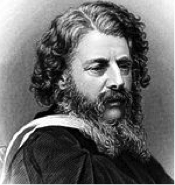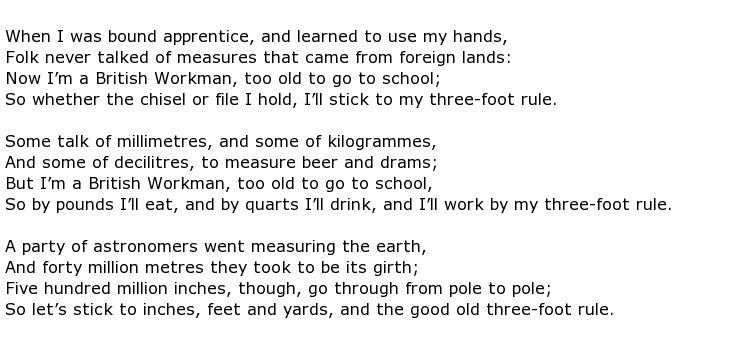 William John Macquorn Rankine was a 19th century Scottish scientist, civil engineer, mathematician and occasional poet. Despite his lofty achievements in complex disciplines such as thermodynamics he demonstrated, in poems like The Mathematician in Love and The Three Foot Rule, a genuinely witty turn of phrase. The latter was well ahead of its time, talking about the reluctance of British workers to adopt the continental metric system of weights and measurements. Over one hundred and fifty years later that reluctance still exists in many quarters.
William John Macquorn Rankine was a 19th century Scottish scientist, civil engineer, mathematician and occasional poet. Despite his lofty achievements in complex disciplines such as thermodynamics he demonstrated, in poems like The Mathematician in Love and The Three Foot Rule, a genuinely witty turn of phrase. The latter was well ahead of its time, talking about the reluctance of British workers to adopt the continental metric system of weights and measurements. Over one hundred and fifty years later that reluctance still exists in many quarters.
He was born on the 5th July 1820 into comfortable circumstances, his father being an army officer and his mother coming from an established banking and legal family. He received home education at first but later went to the Ayr Academy and the High School of Glasgow. The family moved to Edinburgh when William was ten years old and, four years later, he was enrolled at a Military and Naval Academy where he was soon able to develop his burgeoning skills in mathematics. He was also proficient in Latin and an uncle made him a gift of Newton’s Principia, a piece of work written in 1687, in the original Latin.
Rankine was at the University of Edinburgh in 1836, beginning his studies in a number of scientific fields and also natural history. He was a gifted student and won a number of prizes and awards for his work but he was unable to complete his studies, probably due to worsening family financial circumstances. After two years he left to take up an apprenticeship with a railway engineer and, during this time, he developed a clever method for laying out curved railway lines which became known as “Rankine’s Method”.
Over the next two decades he made ever-increasing strides in highly complex areas of science and he was fascinated by the theory of heat and how it can be used to drive a variety of engines. He became deeply interested in the structure of railway carriages and applied his mind to solving mysteries concerned with a number of tragedies that had occurred due to failure of axles and other components. The University of Glasgow used his expertise from the mid-1850s until his death in 1872, where he served as regius professor of civil engineering and mechanics.
Most of Rankine’s literary output was, quite naturally, concerned with scientific studies and instructional text books but he used poetry as a diversion from his otherwise hectic lifestyle. He was a very patriotic man and his compositions such as They Never Shall have Gibraltar and The Three Foot Rule were also turned into songs with a jaunty tune, making them popular amongst those who saw the incursion of European influences on Britain as most unwelcome. The British-ruled enclave of Gibraltar is, of course, still a thorny issue with the Spanish, and it seems they were keen to reclaim that corner of Spain back in the 1850s. Also back then, as now, European influences on such fundamental issues as weights and measures were seen as unnecessary and unwelcome. Rankine wrote the witty poem The Three Foot Rule to illustrate the British reluctance to accept any changes to the “old ways” and it is reproduced here:

As one would expect, he garnered countless honours throughout his lifetime and beyond. He was made a Fellow of the Royal Scottish Society of Arts and, in 2013, he became one of only four inductees into the Scottish Engineering Hall of Fame.
William John Macquorn Rankine died in Glasgow on the 24th December 1872 at the age of 52.

